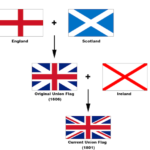by Caroline Malcolm-Boulton
In 1603, Queen Elizabeth I of England died without an heir. As a result, her closest Protestant relative, King James VI of Scotland became the first Scottish King of England, and thereafter, we had the Union of the Crowns.
 Then, in 1707, the Scottish parliament was dissolved and joined with Westminster, and in doing so, Great Britain was formed. This was furthered upon in future years to include Wales and Ireland in the gradual evolution of the United Kingdom.
Then, in 1707, the Scottish parliament was dissolved and joined with Westminster, and in doing so, Great Britain was formed. This was furthered upon in future years to include Wales and Ireland in the gradual evolution of the United Kingdom.
It was many generations later, following the immense international pains inflicted during the Second World War, that Scotland as part of the UK, became a full member of the United Nations in 1945.
Shortly after, in 1973, Britain entered the European Economic Community, also known as the Common Market, and in 1993, this was renamed the European Union-The EU.
Still, after all this time and considering the shifting winds that fertile and changeable decades and centuries have brought, I can’t help but wonder whether the Scots continue to support or even like these unions.
After all, they were not solely made by Scotland and for Scotland, but were agreed upon by a wider institution and have since then, seeped into and embedded themselves within every minuscule part our daily reality.
Indeed, one of the people I spoke to, to try answer my question, Hannah, 39 from Edinburgh, said:
As a Professor of History, I find it curious and archaic that so many Scottish people claim that the unions ought to be maintained because they are historical and have been woven into the very fabric of our national nature. But our unions are in fact recent connections, forged from concerns that were specific to the times. Our first real union was in 1603. So in fact, we have spent more of our national existence as an independent country. I personally am pro both unions you mention, and respect each person’s opinion. But I do find it insensible when they hark on about a romantic and fanciful notion of historic relationships and a bond of true iron, which is of course, as I have explained, utter nonsense.
Starting from the viewpoint of the bigger picture, it is evident that not everyone in our northern nation is singing from the same hymn sheet. In 2014, the Scottish Referendum saw 44.7% of the population vote to become independent of the UK. Furthermore, in 2016, 51.9% of those in the UK chose to leave the EU.
But, after all this, surely it is safe to say that it’s too simplistic to merely presume that half of Scotland likes unions, while the other half don’t, and at the same time, that many more are pro one union but against the other.
This is too clean and uncomplicated, and lacks any explanation as to where these opinions came from and how these statistical conclusions were reached.
To answer the question properly, there is another more knotted and insightful aspect that must be considered. It is that the particular demographic of a person. This includes: where they grew up, where they currently live, their economic, political and social background, their race, gender, age, generation, education and even access to media and especially the intense, critical and dense platforms of social media and citizen journalism can and indeed will influence the formulation of their views.
I spoke to 18 people from across Scotland to ask whether they “liked” unions and if they felt their personal story had motivated their outlook.
During my interviews, I was surprised and intrigued to find that regardless of their opinion, everyone had a lot to say. When I eventually wrote everything up, I found that I had a staggering 193 pages of notes.
For example, James, 46, from Dumfries said that his opinion of Scotland and the UK had evolved over the years. Being from near the border, he had found his social, work based and even cultural life had had a close connection to England, and it subsequently lacked much of the empty, but deep rooted prejudices that can be found further north.
 Nevertheless, James added that he believed Dumfries and Galloway is becoming increasingly affected by an unemployment crisis, as statistics show that jobs are scarce and the range of high income and innovative positions for educated professionals in the region is decreasing, thus bringing the economic value of the area down.
Nevertheless, James added that he believed Dumfries and Galloway is becoming increasingly affected by an unemployment crisis, as statistics show that jobs are scarce and the range of high income and innovative positions for educated professionals in the region is decreasing, thus bringing the economic value of the area down.
James concluded that he feels much of this is due to policies being promoted in Westminster and the EU that cause “…a high influx of immigrants into the country, unbalancing the job market.” He explained how the employment and economic issues in “his part of Scotland,” has made him re-think the idea of Scottish independence, and led him to vote for Brexit.
On the other side of the spectrum, Jessy, 58 from the Shetland Islands said that her location and education have rendered her disinterested in unions. She explained that coming from an isolated community that in many ways had its own separate and fixed culture and a somewhat self-sufficient economy through oil and fishing, made: “Everything that goes on the mainland like a far, far, far away and foreign thing.
The men in Shetland grow up working their own family’s land or boats and take over when they are older. So jobs are safe and all that policy guff doesn’t really hurt us here.
We do our own thing in Shetland. We aren’t bothered by what they decide in England or Brussels.
The cases of James and Jessy show a stark contrast. Clearly, some people believe that the unions influence and interrupt the day to day working of their country. Because of this, they feel swayed by the level of profit and integrity these alliances produce and constantly question the benefits they offer Scotland.
However, it is clear that others do not see, or perhaps understand and recognise the vast number of measures the UK and the EU place upon Scottish life and their intricate implications that will indiscriminately shape our present and future.
Robin, 26, from Perth, on the other hand, views it very differently, saying:
I have no issue with the idea of the UK, but as decent as London’s intentions probably are, they just end up giving Scotland a bit of a raw second class deal. It’s like all their decisions are more geared up for English needs than ours.
And we don’t need the EU anymore. I get how after the war we needed all the friends we could get, but now people are hardly going to just march into another European country and do the things they did then.
Well, I think that there was a time when all these unions were probably a good idea and protected us. Or helped us get ahead. But now they’re just useless and it’s time to get out of it all before it’s too late.
On the other side of argument, Eddie, 19 who grew up in Glasgow, but now studies in London, said:
I for one like our unions. Yes, they have their ups and downs and don’t always benefit Scotland. But, I think they are fundamentally good for us.
When I asked Eddie whether he felt his education had influenced his opinion, he replied saying: “Yes, it definitely has. I think studying more social subjects and reading books helps you to see the bigger story and you learn about aspects that are crucial to the case.
And actually sometimes I find that the less people know about something the bigger their opinions get. We all know people who know little about a given topic but are happy to mouth off about it for hours. I think it’s the same with the question of our unions.
A vast range of people haven’t done their quantitative and qualitative research, but form bold interpretations based on limited research gotten through snippets of conversations or news. It’s a dangerous issue that leads to intense ignorance. Lots of people don’t base their reasons for supporting or rejecting a union based on sound justifications, but on long existing and unexplored prejudice or xenophobia. But it is a bigger problem than we realise.
“But again, I think having a university education can be harmful too. I think having really radical or liberal opinions at university-or just loud opinions is a fashion and almost a requirement rather than a real choice. And to be fair, lots of people at university are naive. My parents aren’t racists, but they work hard in the NHS and education system and understand that things like immigration and EU and UK decisions do really touch us. They’re realistic. But people at university live in a bit of a fantasy world where they don’t get that real life can’t always accommodate utopias, and even the regimes that have attempted to do so, have crumbled, been attacked or become corrupt.
Lastly, Corrie, 42, from near Hamilton looks to the future and said: “I think there will always be faults in any unions and I do not argue that ours have big snags that must be addressed to make them more healthy and to fix Scotland.
I think we need them. The answer is not to throw them away, but sort them. At the end of all the arguments they are important.
In today’s world we need strength in numbers. With travel and technology, and commerce, and media, we live in a very, very connected world, and our country’s own culture is dying. I don’t think we can make boundary lines and separate states anymore. No, no.
With all the big bullies out there and how close we are becoming with all the stuff I’ve said, we can’t do isolation anymore. Individuality or selfish agendas that only meets Scotland’s needs is dated. No, we need to work together and being part of these unions is right and needed I think. They can’t be lost. We wouldn’t survive. They just need fixed.
After scrolling through ‘google’, reading social media posts and talking to 18 people and accumulating 193 pages, I have found that the question of whether Scots like unions is not only a massive one, but more complex than one article can cover.

It is clear that there is no definitive answer, as each and every individual not only has their own tangled web of opinions, but they all have a detailed and complex blueprint of reasons as to how they arrived there.
Then of course, as humans, our feelings are changed on a daily basis, by our distinct experiences, environment and the threads of fake or factual information that passes through our senses.
I think the best way to conclude, is to say simply that some Scots like unions, others don’t, and of course, some are not sure. But, with the future of these unions being presently debated, it is important for all Scots to recognise that their opinions on them should be a pressing and real area of interest.
After all, the UK and EU, are not only ingrained in our history and affect our relationship and involvement with the rest of the world, but considering it does influence each one of us, from the price of a pint to a leg of beef; from the health of the stock market to our tax rates. And from the environmental regulations, living costs, working rights, housing costs and the quality of health and education that we encounter every day, Scots need to think more widely and certainly more carefully about what these unions mean to them and to what extend they like them.
- THEATRE REVIEW: Who’s Afraid of Virginia Woolf? - 11th May 2017
- Out Of This World (WORLD PREMIERE) at Macroberts Theatre - 28th April 2017
- Decline and Fall (BBC TV Mini-Series 2017) - 22nd April 2017
